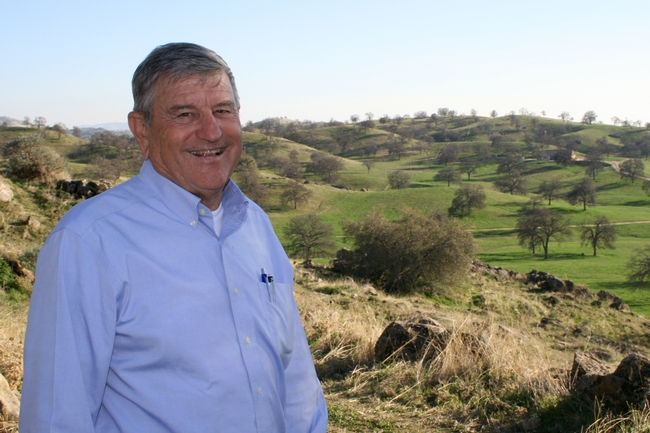UCCE advisor McDougald retires to roam the range
“Rangeland has always been a passion for me – rangeland and livestock,” he said. “I like what grows there. I like the relationships. I’ve always understood it. I don’t care if it’s public land or private land, if it’s rangeland, I’m all in.”
McDougald earned a bachelor’s degree in agriculture from California State University, Fresno and a master’s degree in range management from UC Davis. He spent the first 10 years of his career as a rangeland manager for the Forest Service, then joined UC Cooperative Extension in 1978 as an advisor in Madera County for livestock and natural resources. He is currently also the director of UC Cooperative Extension in Madera County and the manager of the nearby San Joaquin Experimental Range.
McDougald’s family has deep roots in Madera County. On a drive from his Madera office to the San Joaquin Experimental Range, he points across the street and explains that his mother’s family donated land for the historic county courthouse, built in 1900. He discusses his family’s involvement in the local beef and timber industries. And before we arrive at the experimental range, we drive by the entrance to his family’s ranch, which has been home to seven generations of McDougalds.
“I’ve always had an interest in the ranch – and I would have come back no matter what – but I was lucky. I was able to come back to the ranch and work here in Madera too,” McDougald said. “This has been my office since the day I started working for UC Cooperative Extension.”
One of the major accomplishments in McDougald’s career has been helping to establish residual dry matter standards, which measure dry plant material left over from the current year’s growth as a way to gauge the health of rangeland.
Mel George, UC Cooperative Extension specialist in the Plant Sciences department at UC Davis, explained that these standards are an alternative to the range condition method, a once commonly used method, which George says didn’t work in California.
“Neil was instrumental in taking these new ideas – residual dry matter standards – to the Forest Service,” George said. “And then every federal agency of any consequence, when it comes to land management, also adopted these standards for local, state and federal lands in California.”
Today the range condition method has been replaced throughout the West with a more comprehensive set of metrics, but residual dry matter standards continue to be used by land managers in California as one way to quickly and simply evaluate rangeland, George explained.
McDougald also helped develop mountain meadow standards, determine values of rangeland loss in wildfires, and establish a system to determine livestock-carrying capacity for rural lands under the Williamson Act. These science-based standards assist in evaluating the health of rangelands and often support continued use of land for grazing.
Each year, McDougald’s seasonal routine mimics the historic movement of cattle in the area.
“In the spring, we work in annual grasslands because it’s beautiful,” he said. “And when it gets hot in the summertime, I go straight to the mountain meadows. It allows me to look at both annuals and perennials – that’s the fun part of it for me. I get to know all the cool-season plants.”
McDougald has brought this rangeland experience to address various aspects of natural resource management. In 1986, he was the first advisor assigned to work for the Integrated Hardwood Range Management Program, where his work focused on effective grazing in oak woodlands, forage production under oak canopies and monitoring grasslands. He later added a focus on rangeland water quality to his expertise, as a regional watershed advisor looking at beef cattle and pack stock. As part of a UC Cooperative Extension team, he assessed possible risks to water quality and then developed management practices to mitigate or reduce those risks.
His plans for retirement include some travel, more fishing and continuing to manage rangelands for his family’s ranch and the San Joaquin Experimental Range. The university has granted McDougald emeritus status so he will also finish up the research projects he has currently under way.


Posted by Robert J Keiffer on February 23, 2012 at 5:30 PM